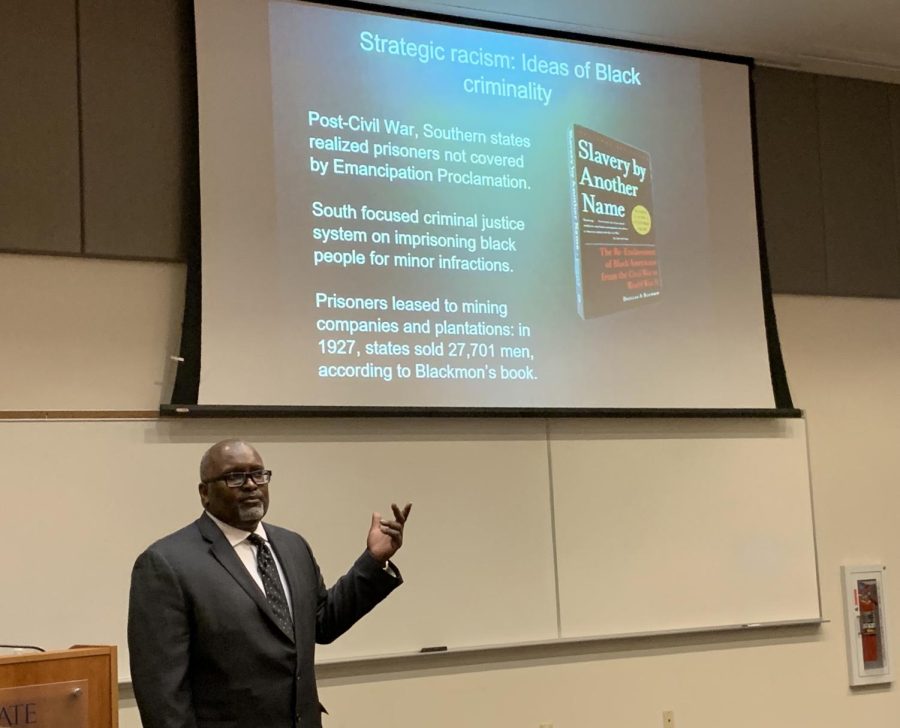Ethics expert, TV critic speaks about racism in media
Deggans presented one source of his research, “Slavery by Another Name,” to support how history is important to better understand media racism Tuesday, Feb. 11, 2020.
February 12, 2020
Opposing racism and its disrespectful terms is more complicated than it seems, a TV critic for NPR told the audience at the second annual David and Janet Dix Lecture in Media Ethics Tuesday.
“White privilege and supremacy are terms that are hard for some people to hear,” said Eric Deggans, a journalist. “But if you don’t accept them, you’ll never allow yourself to commit to unwinding pre-installed racist beliefs.”
Deggans’ lecture addressed racism and white supremacy in America, mainstream media misconstruing information and the effect of media coverage on individuals.
Despite open racism becoming socially unacceptable in the 1960s, certain challenges regarding racism still need to be addressed, Deggans said.
Ethnic groups are known to view race issues differently. However, Deggans said, some white Americans refuse to believe they are racist because they think white supremacy is invisible.
“Admitting to socialized racism is like admitting you’re a ‘bad’ person,” he said. “This makes you more vulnerable to racism’s effects because you refuse to see it.”
Media outlets, specifically Fox News, only present information from a white, male political lens, Deggans said. Sources who align with Fox News echo its conservative worldview and invalidate other mainstream media sources.
“Fox News’ position regarding race is that ‘widespread, systemic racism against nonwhites is not a problem in America,’” he said. “However, this only results in more media polarization.”
Deggans outlined four types of racism prevalent in American culture and media:
-
Bigotry denial syndrome: An individual in media refuses to believe their coverage is racist because they are not racist.
-
Situational racism: Using prejudice and stereotypes against selected people of color, often those you dislike.
-
Strategic racism: Stereotypes of marginalized groups are used for political, material goals.
-
White privilege: Benefits of society are extended to white people, which is often taken for granted or unspoken.
“I perceive racism as a social construct that was fine tuned in America to justify slavery,” he said. “But now we are stuck with all this racism in media and those types of racism associated with it. Now the question remains, ‘How do we unwind it?’”
Although no formal solutions exist to combat media racism, Deggans suggested some ways for media professionals and future journalists to overcome it.
First: diversify sources. “You will discover things that you didn’t know about the situation because you’re taking into account different perspectives you normally ignore,” he said. “You might not even realize there are real world impacts on your journalism. (Doing so) makes your stories more accurate, powerful, interesting and credible.”
Then: listen to a wide range of news sources. “Your media diet has got to be a little more varied than Trevor Noah and Seth Meyers,” Deggans said. “If you only consume news from one or two media outlets, and that news outlets make a mistake, it’s less likely you’re going to figure that out.”
Last: challenge race issues within an organization, whether it is in-person or over social media.
“Rise up and say, ‘I am not going to take that,’” he said. “Ultimately, as young people, you will be pulling your organization into places they don’t want to go, and you need to feel empowered to do that.”
Deggans’ speech was funded by an endowment from David and Janet Dix, a retired publisher and a counseling psychologist. This lecture series recognizes figures like Deggans who discuss critical issues in media ethics. Dix believes ethics is important now more than ever, said Jeff Fruit, interim director of the School of Journalism and Mass Communication.
“This has been a strong focus for our program, and (David Dix) said, ‘I just want to make sure that (ethics) remains an important thing and top of mind because it is so important in my business and so important in our industry as a whole,’” Fruit said. “It gets a lot of spin-off discussion going, and it’s a lot of value for us being able to do these kinds of things.”
Jan Leach, an associate professor in the School of JMC and coordinator of the lecture series, admired Deggans’ position on media ethics and was grateful for the points he made.
“We have a responsibility as media: ‘when do we do our jobs correctly? When don’t we? What are the new hampers and roadblocks to doing that job?’” Leach said. “It’s really important now that we have access to information and that you’re able to evaluate the validity or authenticity of that information.”
Students said they appreciated Deggans’ insightfulness on racism in media. Tom Mazzella, an applied communications major, described media’s hidden role as gatekeepers to information
“eye-opening, and in a way, mind-boggling.”
“There are still hidden forms of racism that many media outlets in this country get away with and are seen as presentable,” Mazzella said. “I will make sure moving forward that I have all the necessary information that is available to me (…) before making decisions about where I stand with issues facing our country such as (racism).”
Deggans hopes journalism students will apply the suggestions he presented to make it easier for them to report stories with impact.
“I think what hopefully the kids learn is, here’s all the stuff that you’ll have to contend with and think when you get out there,” Deggans said. “So, when you encounter it, you can handle it and successfully navigate it as a journalist.”
Contact Brady Warmbein at [email protected].

























